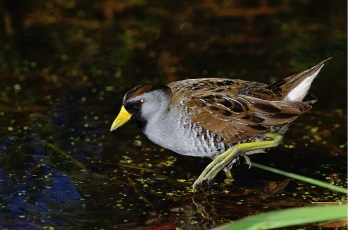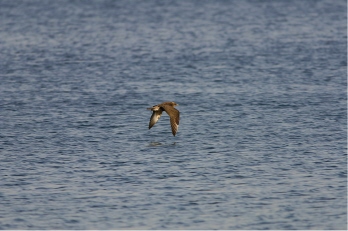The Reluctant Twitcher (15 page)


Photo by
Sam Barone.
Sora. Red Bay, north of Wiarton. These feet were made for skittering
around on lily pads.
To quell the
Reisefuehrer
's whining about geese, Dave and I agree to a quick side trip out to Jack Miner's where Hugh hopes for Snow Goose, Ross's, and Greater White-fronted. He spurns my road map and navigates by memory. We see a lot of countryside. The
Reisefuehrer
sinks rapidly into the Slough of Despond. Finally, after humiliating himself by asking directions, we arrive at the Sanctuary, which is closed. Beadle generously points out nine Canada Geese grazing in the field across from the gate. Hugh does not respond. I remind him of Beadle's First Law: One tends to see a good bird after some major cock-up. He is not cheered. Only some big rarity is going to pull him out of this. I ask Dave what he wants to do. He says he would like to see something really good. Who wouldn't? Hugh and I still
need
Western Sandpiper, so we decide to go to Blenheim Sewage lagoons on the way home. You never know.
It turns out not to be an error.
When we hit the Blenheim lagoons, Dave and Hugh head in immediately. By the grace of God I am detained for a minute at the car, and just before I head off to catch up with them, I see a vehicle screech to a stop and Ron Tozer jumps out and starts telling people something. I think I hear a bird mentioned, but know it can't be what I think, so I wait till Ron walks up and says, “Jim [James T.] Burk has found a Wheatear at Shrewsbury.”
Beadle and Currie are stopped dead in their tracks by my yell. By my gesticulations they know something is up and come back with due celerity. Seconds later we are fishtailing down the road, heading for Shrewsbury with the
Reisefuehrer
calling out short-cut directions. Even Dave is excited. It will be a first for him in Ontario as it will for me. We have got to get this bird.
As we scream up, there are some twenty people milling about. What the hell is the matter with them? No one is looking.
“Is the Wheatear gone?” I ask, heart sinking into my boots.
“It's just down over the bank for a moment,” says the closest birder. Suddenly, up it pops, hawking for a huge cicada-like insect. It then lands nine metres away and spends the next ten minutes trying to dispatch and consume said insect. I get the
Northern Wheatear
(287) in my scope at high power and it is, as they now say, awesome.
John Carley arrives and sees the bird, and I find I am genuinely glad for him. I am going soft. I am worried about Margaret, though, who left for home before we did. I borrow a phone to call her, but the guy beside me tells me Margaret was here half an hour ago and saw this bird. Great, I won't have to play it down for her and tell her it was just another bird and not to worry about missing this one just like the one she looked so hard for but failed to find on Wolfe Island last week. Hughie is ecstatic and all thoughts of the Jack Miner debacle are banished from his mind. Dave and I are equally ecstatic getting a new Ontario bird. The trip home is quite jolly. I am at 287 and possibly on a roll.
After nearly killing ourselves at Lynde Creek and elsewhere, Margaret and I, albeit on different days, finally get
Hudsonian Godwit
(288) on October 14â15 at Coot's Pond, Darlington. Margaret and everyone else find it easily at the west end of the pond, right where it's supposed to be. The morning I go, the thing decides to hide for a while in deep reeds. I rush down to the east end in desperation. I look everywhere. Obviously I am to be the first to miss this bird. As I walk back dejectedly, I notice a Hudsonian Godwit casually feeding at the west end, right out in the open about eight metres from me. The bird winks and appears to perform a slight salaam â Gotcha! â though the uninitiated might think it is just scratching its head. Birds do have a sense of humour, you know, and anyone who has birded extensively knows they can be perverse. This bird gave me a bit of a scare before relenting.

Confusion now hath made his masterpiece.
â S
HAKESPEARE
,
M
ACBETH
, A
CT
II
I
KNOW FOR CERTAIN THAT
to get to three hundred, one has to get things like all three jaegers and spend some time at Van Wagner's Beach. That is practically axiomatic. I also know that the best time for Long-tailed Jaeger is late August/ early September.
Somehow it is more than halfway through October and I have only been over at Van Wagner's once. How can this be? I go more than once even when I am not doing a Big Year. Am I not serious about hitting three hundred? I've already missed the Long-taileds; do I want to miss Parasitic and Pomarines, as well?
I phone Margaret and we begin our vigil on the meretricious weather websites, waiting for strong east winds. We both
need
Pomarine Jaeger and she
needs
Sabine's Gull in addition. October16 is to be the day. Early in the morning we are on our way. The last thing I want is to get there at noon and hear from all the Hamilton gang that while jaeger activity has been ferocious all morning, matched only by rare gulls and shearwaters, it seems to have dropped off utterly during the last half hour and is doubtless over for the day.
Margaret and I arrive early. There are only two or three diehards there, Norm Murr and Dave Don among them. We set up. I begin to stare hard, prepared to continue for at least twelve hours unless I get jaegered out earlier. A few other birders straggle in, among them Barry Cherriere and Cheryl Edgecombe. For a long time I see nothing. But neither does Cherriere, so there's nothing out there.
Suddenly, I see it. A big dark-morph Pomarine Jaeger. Funny no one else has seen it yet. I call it. “Big dark Pommie, coming in from the north, quite far out.” I keep up the directions, as is expected. “Floating in about ten o'clock, up fairly high, a scope frame above the horizon, peeling off, starting to dive down toward the water in a slow floating arc, quite low now.”
It seems odd that no one else has seen it yet. It's a dandy, dark adult. I keep up the patter. “Right down on the water now, hovering, starting to go back up just the way it came, higher and higher, peeling left.” It is at this moment I have a disheartening revelation. This is no jaeger. It's a bloody floater! For the younger set (the under-eighties), floaters are those things that lazily drift across your eyes in larger sizes and ever increasing numbers as you age. There is even such a thing as a floater shower â of great interest only to ophthalmologists. Can you imagine thirty to forty jaegers whipping around in your scope? Bruce Falls says it happens all the time.

Photo by
Carol M. Horner.
Pomarine Jaeger (juvenile). Lake Simcoe. After entanglement with fish
hooks and line, this bird eventually died.
Anyway, what do I do now? Make a clean breast of it, or say I've suddenly lost it on the horizon in the chop and heat shimmer? Could I stand having Barry and Cheryl think I am any more bogus than I actually am? And what if Cherriere says, “I'm outta here if this guy is going to stay.” Though a scrupulously honest person, I am unable to emulate George Washington. They know I am lying but are very good about it and let on that it was their fault they couldn't get on to the bird. Margaret, on the other hand, who would have seen a House Fly at two kilometres, gives me a very odd look. She is a doctor.
Half an hour later, I see another jaeger, very high and very far off, kind of hovering and fighting the wind. I watch the bastard to make sure it isn't another treacherous floater trying to make a fool out of me. This one is definitely a bird. Finally, I mention it. Barry casually says, “It's a Short-eared Owl; been there all morning.”
That's it. I'm never calling another bird. I am devastated, my non-existent reputation in shambles. What's a frigging owl doing hovering high over Lake Ontario in thirty-kilometre winds? No one knows, but he remains there all day. I take a strong disliking to marine owls.
I vow to keep my gob firmly shut for the rest of the day. I don't care if an albatross appears; I'm not saying anything. Half an hour later a big dark lumbering jaeger chases a smaller, more agile Parasitic Jaeger across the bay right out in front of us. “
Pomarine Jaeger
!” (289) Margaret and I both yell. I have learned nothing, but at least it
is
a Pomarine Jaeger. We see several more during the day and a few more Parasitics, and at one point a Black-legged Kittiwake flies up and lands right in front of us on the beach.
Then things quiet down, though floater action is terrific. Cherriere stares silently through his scope without surcease. Though I have terrible eye fatigue, I don't want to appear frivolous in front of Barry and Cheryl. I stare on in a trance. Suddenly, Barry yells “Sabine's Gull.” I force myself to look, even though I don't really
need
it. I immediately see it. Margaret, who
needs
it, does not. This worries me. I have to drive home with her and I hate to see adults cry. Barry continues the patter and, thank God, Margaret sees the bird. I am happy for her. No, really. When this altruism kicked in, I don't know. I may be ill. But we are now in this together and I really want her to make three hundred, too. Besides, it is only fair; it was Barry who found me my Sabine's Gull way back on September 8.
It was a good day, almost a perfect day, if only it hadn't been for the damn floaters.

I can't horse around here all day.
â
IMPATIENT TWITCHER IN
T
EXAS
A
POSSIBLE
W
HITE-FACED
I
BIS
turns up in Hamilton. Margaret and I wait for a picture that shows its red eye and then, on October 20, we race off to Dundas Marsh. As we burst forth from the five-metre-high phragmites, I see Roy Smith and Winnie Poon in a group of people. Are they looking dejected or triumphant? If the bird is there, why isn't Winnie photographing it? Several people are talking about a nearby Cackling Goose. Cackling shmackling. “Where's the bloody ibis?” I am about to ask in a most forceful manner, when I notice it placidly feeding nearby. It is indeed a
White-faced Ibis
(290), and we get long, delicious looks at it. Eventually I even condescend to glance at the Cackling Goose; a nice little bird, but it doesn't even have red eyes.